Cytotam 20mg Tamoxifen Tablets
$80.00 – $210.00Price range: $80.00 through $210.00
Cytotam 20 is used to treat breast cancer. It contains Tamoxifen, which works by blocking estrogen receptors on cancer cells, helping to slow or stop their growth.
| Pack Size | Price | Price / Unit | Quantity | |
|---|---|---|---|---|
| 100 Tablets | $80.00 | $0.80/ unit | ||
| 200 Tablets | $150.00 | $0.75/ unit | ||
| 300 Tablets | $210.00 | $0.70/ unit |
Looking for bulk / B2B pricing? | Send Inquiry |

| SKU | 11099 |
| Manufacturer | Cipla Limited |
| Categories | Anti Cancer |
| Delivery Time | 10 - 14 Working Days |
| Strength | 20mg |
Introduction to Cytotam 20mg Tablets
Cytotam 20 Tablet is an anti-estrogens. It is used in the treatment of breast cancer. It is also used to reduce the risk of breast cancer in pre- and postmenopausal women with a high risk. This medicine helps to slow down the growth and multiplication of Cancer cells.
Cytotam 20 Tablet is also helpful in the treatment of infertility. It can be taken with or without food, but take it at the same time to get the most benefit. It should be taken as your doctor’s advice. The dose and how often you take it depends on what you are taking it for. Your doctor will decide how much you need to improve your symptoms.
Before taking this medicine, tell your doctor if you are on treatment of infertility or had a blood clot disorder. Your doctor should also know about all other medicines you are taking as many of these may make this medicine less effective or change the way it works. Tell your doctor if you are pregnant or breastfeeding.
Uses of Cytotam 20mg
- Breast Cancer Treatment
- Ductal Carcinoma in Situ (DCIS)
- Metastatic Breast Cancer
- Breast Cancer Recurrence Prevention
- Infertility and Hormonal Disorders
How Does Cytotam 20 works?
Cytotam 20mg contains tamoxifen, which works by blocking the effects of estrogen, a hormone that can promote the growth of certain breast cancer cells. It binds to estrogen receptors in breast tissue, preventing estrogen from attaching to these receptors. This action slows down or stops the growth of hormone receptor-positive breast cancer cells.
In addition to treating breast cancer, Cytotam is also used to prevent cancer in high-risk individuals. By reducing estrogen’s effect on breast tissue, it lowers the chances of cancer cells developing or recurring. This makes it an effective preventive therapy for those with a family history of breast cancer.
Side Effects of Cytotam 20
Common Side Effects
- Hot flashes
- Nausea
- Vaginal discharge
- Vaginal bleeding
- Mood swings
- Fluid retention
Serious Side Effects
- Blood Clots (Thromboembolism)
- Stroke
- Endometrial Cancer
- Liver Problems
- Cataracts and Vision Changes
- Severe Skin Reactions
- High Calcium Levels (Hypercalcemia)
Dosage of Cytotam 20mg
- The typical dosage for breast cancer treatment: 20 mg to 40 mg of Tamoxifen per day, taken as a single dose or divided into two doses (e.g., 10 mg twice daily).
- The duration of treatment can vary based on the stage of cancer, response to therapy, and individual patient factors.
- For breast cancer prevention in high-risk individuals: The recommended dosage is typically 20 mg of Tamoxifen per day for up to five years.
- Dosage adjustments or different regimens may be required based on the patient’s medical history, age, and overall health
How to Manage Side Effects?
- Take prescribed anti-nausea medications.
- Wear head coverings for hair loss.
- Monitor for signs of infection.
- Report unusual bruising or bleeding.
- Use mouthwash for mouth sores.
- Avoid hot flashes with cooling methods.
- Take breaks and rest frequently.
- Follow up with regular health check-ups
Warning & Precautions
1. Increased Risk of Uterine Cancer:
- Tamoxifen may increase the risk of endometrial cancer; regular gynecological check-ups are advised.
2. Blood Clots:
- Cytotam may raise the risk of blood clots, including deep vein thrombosis and pulmonary embolism. Seek immediate medical help if experiencing leg swelling or chest pain.
3. Liver Function:
- Tamoxifen can affect liver function. Liver tests should be conducted regularly during treatment.
4. Pregnancy & Breastfeeding:
- Cytotam can harm the unborn baby and should not be used during pregnancy. It is also not recommended during breastfeeding.
5. Eye Problems:
- Rarely, tamoxifen can cause vision issues, including cataracts. Regular eye exams should be conducted.
6. Hot Flashes & Menopausal Symptoms:
- Tamoxifen may cause hot flashes and other menopausal-like symptoms.
7. Bone Health:
- While tamoxifen can help protect bones, long-term use may affect bone density. Bone health should be monitored.
8. Drug Interactions:
- Inform your doctor of any other medications you are taking, as Cytotam can interact with certain drugs, especially blood thinners.
9. Women with History of Stroke:
- Tamoxifen may increase the risk of stroke, especially in women with a history of cerebrovascular issues.
10. Regular Monitoring:
- Periodic health check-ups, including blood tests, liver function, and gynecological exams, are essential during treatment.
Safety Advice
- Prescription Only
- Medical History
- Pregnancy and Breastfeeding
- Blood Clot Risk
- Endometrial Cancer Risk
FAQs – Frequently Asked Questions
1. Can I still have regular menstrual cycles while taking Cytotam 20?
Some women may experience changes in their menstrual cycles while taking Cytotam 20, including irregular periods or amenorrhea (absence of menstruation). These changes are generally temporary and resolve after treatment is completed.
2. What if I stop taking Cytotam 20 Tablet?
Do not stop taking Cytotam 20 Tablet even if you start feeling well, unless your doctor tells you. Stopping it early may increase the risk of breast cancer coming back.
3. Can Cytotam 20 Tablet be used in pregnant women?
No, Cytotam 20 Tablet is not recommended for use in pregnant women as it can affect the unborn child.
4. Can Cytotam 20 interact with other medications?
Yes, Cytotam 20 can interact with other medications, including blood thinners, certain antidepressants, and some other cancer treatments. It is important to inform your healthcare provider about all the medications and supplements you are taking to avoid potential interactions.
| Pack Size | 100 Tablets, 200 Tablets, 300 Tablets |
|---|---|
| Price/Unit | $0.70 /unit, $0.75/unit, $0.80/unit |
Be the first to review “Cytotam 20mg Tamoxifen Tablets” Cancel reply
Related Products
Anti Cancer
Anti Cancer


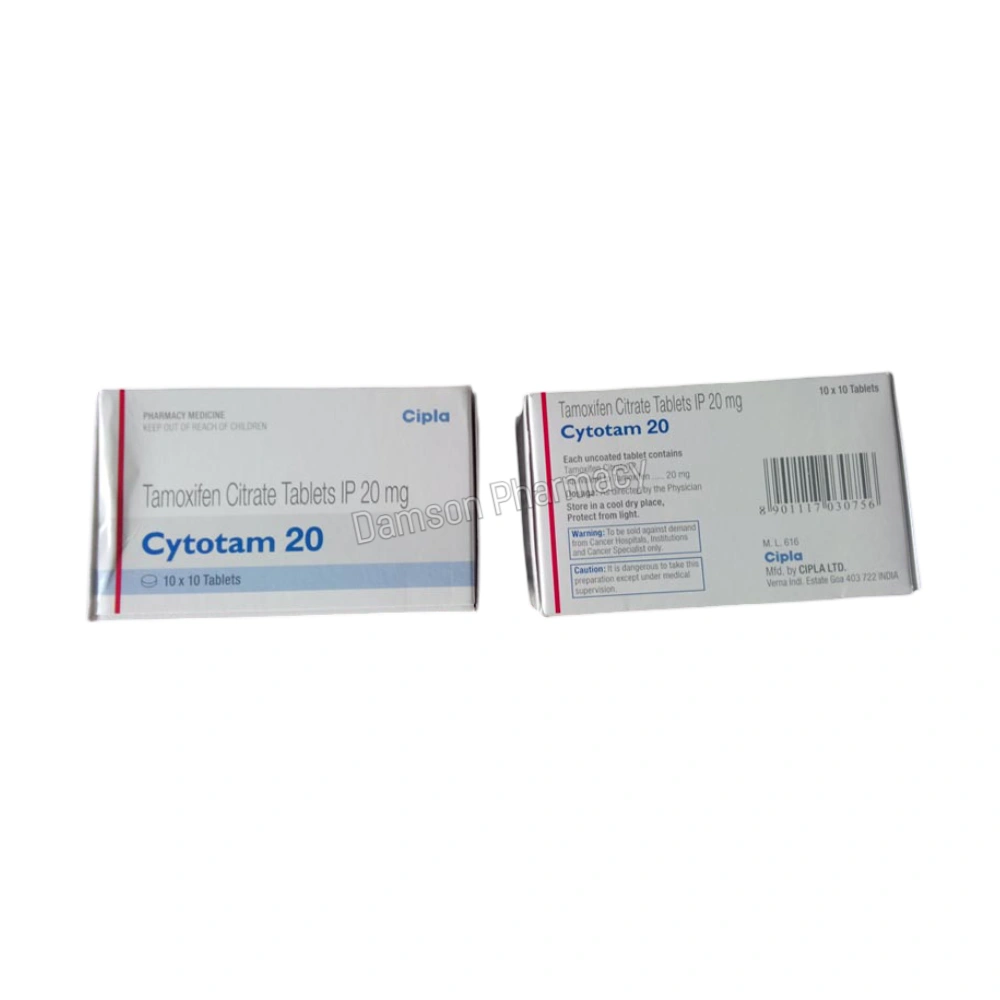
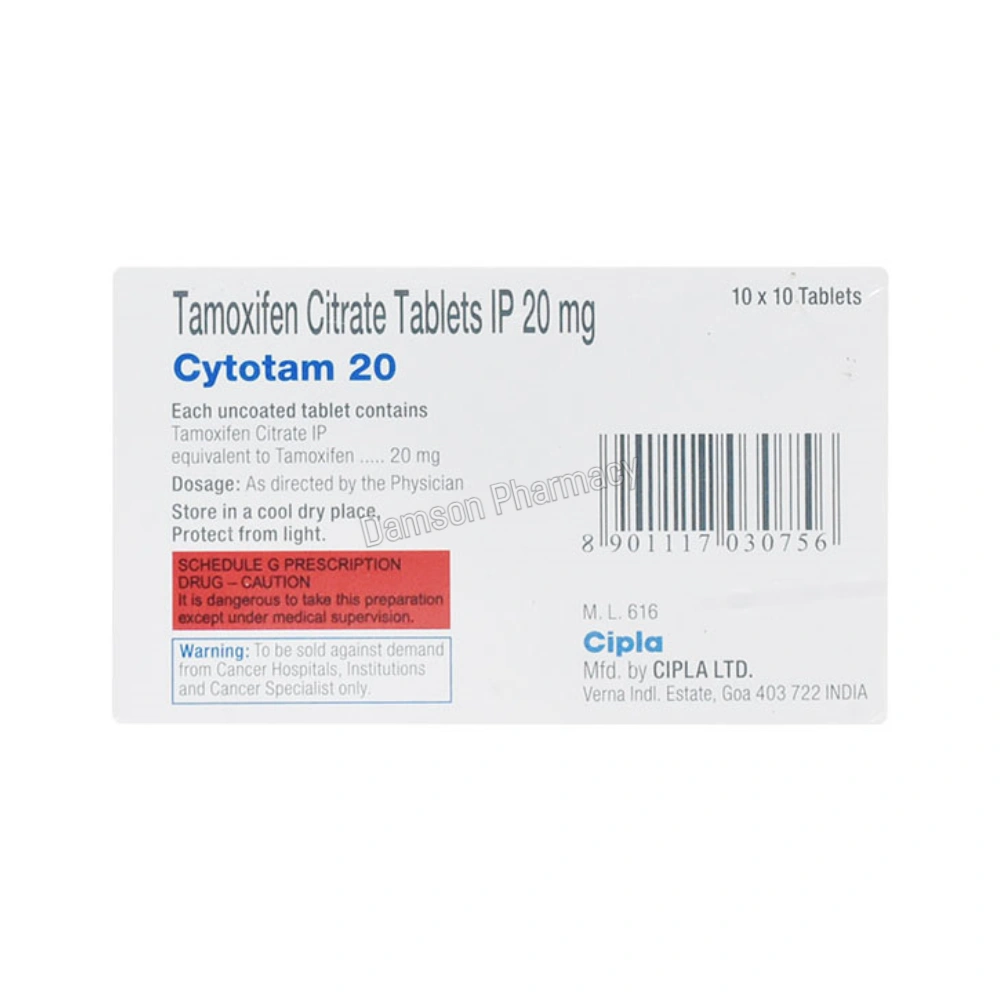

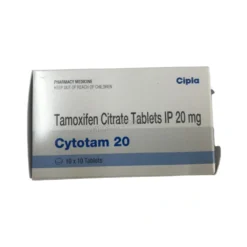
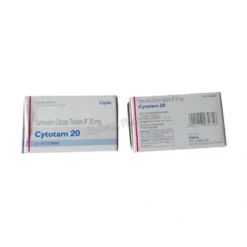
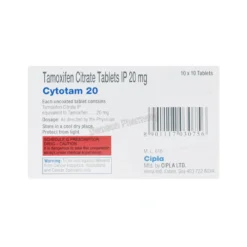

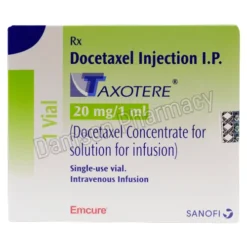


Reviews
There are no reviews yet.